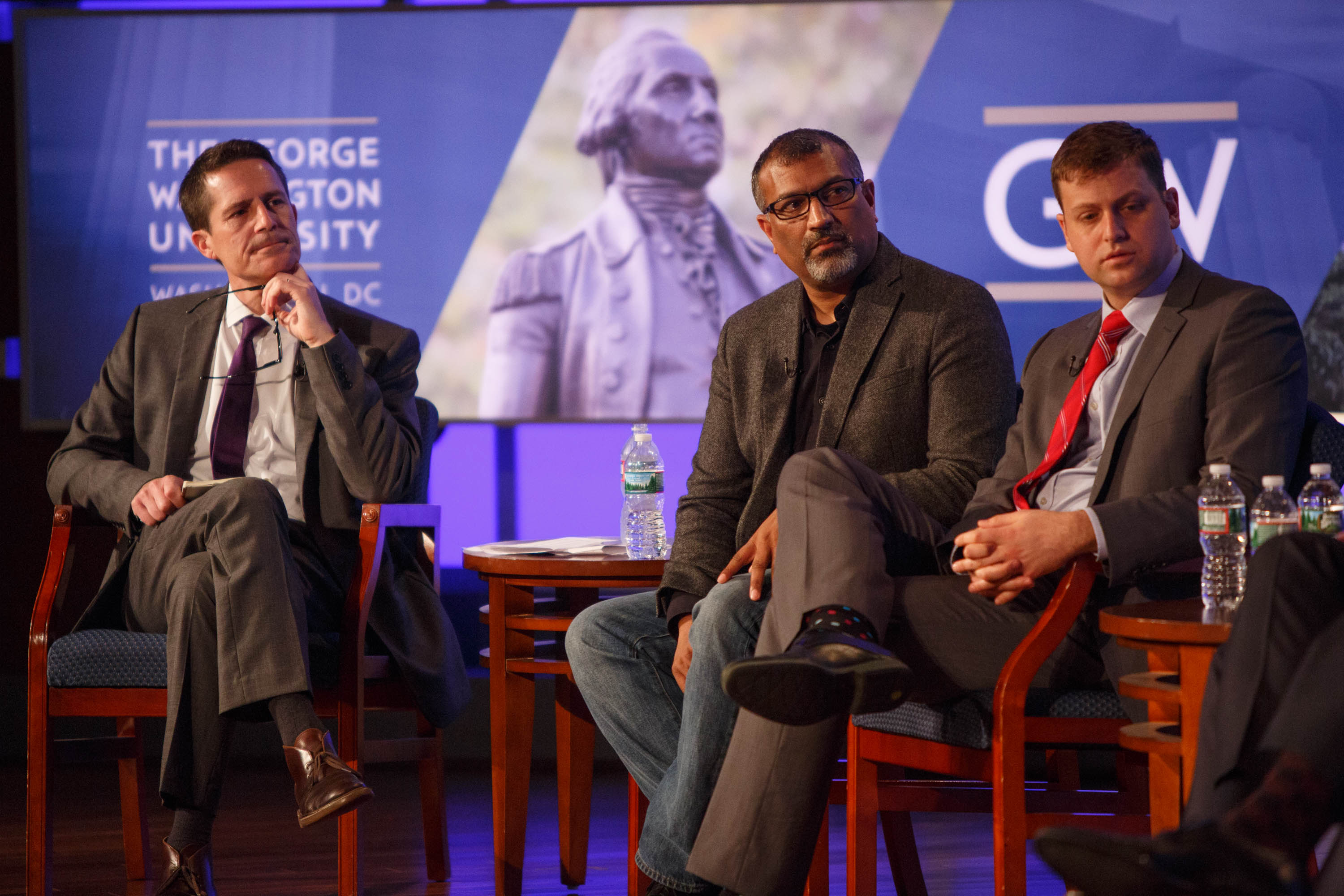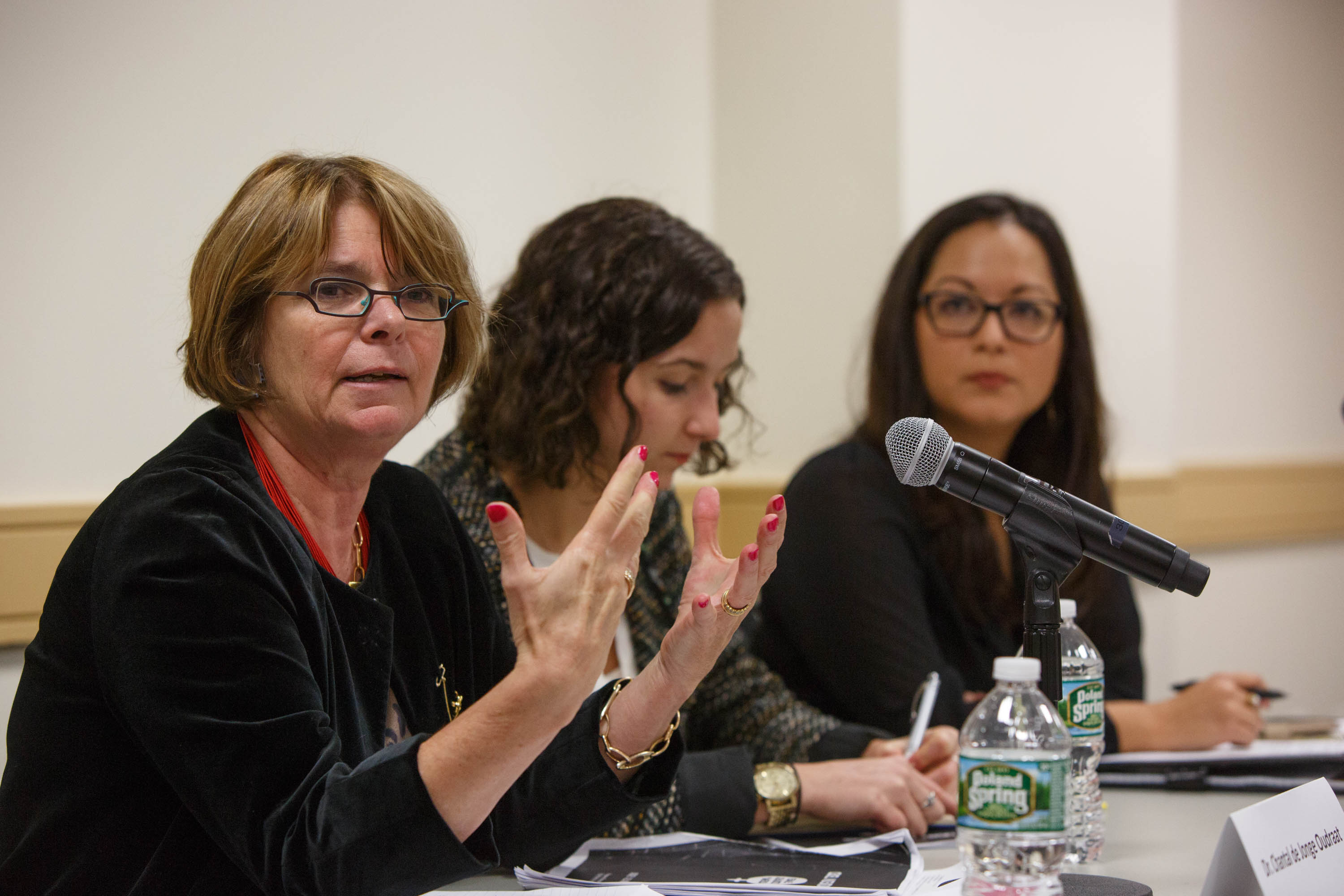By Kristen Mitchell
The most significant tool extremists have at their disposal is passion, said Shahed Amanullah, a former senior adviser to the State Department.
Passionate people relentlessly will pursue ways to spread their ideology and recruit new followers, regardless of how often their Twitter accounts are blocked or their Facebook posts removed, he said. Matching that zeal is difficult.
“Nobody wakes up in the morning and says, ‘I can’t wait to go out there and fight extremism,’” he said. “You can’t generate that kind of passion on the other side, and that’s the challenge that we have as people in the Beltway who are focused on this issue.”
Mr. Amanullah is the co-founder of Affinis Labs, a community-focused enterprise that aims to nurture Muslim talent and entrepreneurship. He spoke at Jack Morton Auditorium Tuesday as part of a panel on “Understanding Online Counter Messaging” during George Washington University’s two-day symposium, co-sponsored by the Program on Extremism and GW Law.
The conference, titled “Toward a Global Partnership to Counter Online Radicalization and Extremism,” featured government and industry leaders who talked about anti-terrorism efforts and challenges.
George Washington President Steven Knapp hailed the Program on Extremism Monday while opening the symposium. The program has become a go-to source for officials on Capitol Hill and in the media, he said.
“The work of this program, and others in the field, has identified the need for policies that will counter radicalization when it’s still in it’s infancy and also the need to take fully into account the international scope of the problem,” Dr. Knapp said.
The Program on Extremism tracks the number of individuals charged with offenses related to ISIS in the United States and demographics like their age, sex and charges as part of an ISIS in America: From Retweets to Raqqa report.
Groups like ISIS and al-Qaida have used the Internet to connect at-risk individuals across the world. ISIS uses social media networks to encourage supporters to commit violent attacks in their communities, teach them methods to carry out attacks, praise individual actors and spread propaganda.
Brian Fishman, lead policy manager of counter terrorism at Facebook, said Tuesday ISIS has ramped up its online presence in the past few years and companies are responding. It’s in Facebook’s best interest to crack down on extremist messaging, he said.
“We have a responsibility to our community to keep them safe, to create a safe environment for people to share with one another,” he said. “We feel that that is part of our mission as a company.”
People are more likely to share and post when they feel safe, Mr. Fishman said, which feeds into Facebook’s business interests as well. The result is Facebook’s commitment to doing good in the community and well financially.
Ahmed Younis, deputy special envoy and coordinator for the State Department’s Global Engagement Center; George Salim, director of the Department of Homeland Security’s Office for Community Partnerships; and Dan Keyserling, head of communications for Jigsaw, a technology incubator under Google’s parent company, also joined the panel, moderated by Washington Post reporter Greg Miller.

Baroness Joanna Shields gives a keynote address Monday. She said the Internet can make extremists believe their fringe ideas are mainstream. (William Atkins/ GW Today)
Each tragic event confirms the radical online community’s ability to incite violence, said Baroness Joanna Shields, M.B.A ’87, and the United Kingdom’s minister for Internet safety and security. Most recently this includes an attack in London near the Houses of Parliament, an institution Dr. Shields called her home and place of work during her keynote address Monday.
“It is indeed ironic that one of humanity’s greatest inventions, it’s most liberating inventions, the Internet, is being misused in this way as a vessel for violence and hate,” she said.
Governments and technology leaders have been working to clamp down on online extremism through partnerships that expedite removal of extremist content on social media sites, reinforced by fines and sanctions. This is not enough, Dr. Shields said. Industry has to drive the change.
“While violent extremist groups seem to undermine the very ideals and values that the Internet was established to advance, we must reinforce its capability to be the answer to hatred and intolerance rather than a vehicle for it,” she said.
James Baker, general counsel for the FBI, said during a Monday panel “The Challenge of Emerging Encryption Technologies” that the growing use of encrypted devices pose a challenge for law enforcement investigating extremism.
In December 2015, two homegrown extremists killed 14 people in San Bernardino, Calif. During its investigation the FBI asked Apple to help them get into a locked iPhone belonging to one of the shooters, but Apple refused. The dispute is just one example of the ongoing feud weighing privacy and public safety between law between and technology companies.
Mr. Baker said it’s important for both sides to find consensus and work through legal scenarios where they can find common ground.
“Quite frankly, we want to do this now, we don’t want to do this in the aftermath of some serious event, when we’re going to be under pressure to make decision, and we might not make good decisions,” he said.
Bijan Madhani, public policy and regulatory counsel for the Computer and Communication Association, said during the Monday panel discussion the rise in encryption apps is a result of the public’s recognition that what they do on the Internet is not as secure as they previously thought.
Revelations by former government contractor Edward Snowden about National Security Agency surveillance and regular security breaches contributed to the public’s growing awareness of the issue, Mr. Madhani said.
Luigi Soreca, director for international security at the European Commission, also participated in Monday’s panel, moderated by Wall Street Journal reporter Shane Harris.




